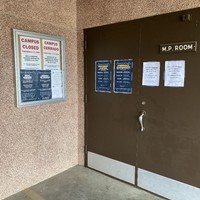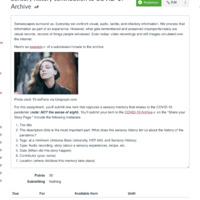Item
Silent Bells & Quiet Halls: An Auditory Experience of the COVID-19 Pandemic
Media
Title (Dublin Core)
Silent Bells & Quiet Halls: An Auditory Experience of the COVID-19 Pandemic
Description (Dublin Core)
In almost every aspect of life, COVID-19 has put the world on mute. From canceled weddings and downsized gatherings to remote workspaces and quiet homes left behind by those we have lost, the overwhelming soundtrack of the pandemic is silence. When K-12 students in the United States transitioned to distance learning nearly 10 months ago, elementary, middle, and high school campuses were abandoned, leaving bells silenced and hallways quiet.
From March to November, this silence came to define my work at Princeton Joint Unified School District in the rural town of Princeton, California. No longer did bells ring to mark the end of one period and the beginning of another, lockers no longer slammed shut as students rushed to gather their belongings, and students could no longer be heard gossiping, laughing, and playing during morning break. While this silence initially felt like summer vacation had merely arrived a few months early, the lack of auditory stimulation began to diminish morale and decrease productivity as work felt further removed from the students themselves, transforming human beings into pieces of data and names on a paper.
I could often go an entire eight-hour shift without speaking to another person, frequently finding my voice raspy when I would pick up the phone for the first time in hours. Even among coworkers, passing conversations vanished and became simple one-line emails dealing only with the business at hand. As Zoom calls replaced in-person staff meetings and participants remained on mute, the noisy world in which I once worked fell even further away.
When in-person learning became optional in November, the sound slowly began to return, but it had changed from what it once was. Growing accustomed to the silence over the long summer, I often found myself jolted in surprise at each unexpected bell or sound of students on the playground. The number of students has drastically lowered since we first closed in March, as many opt to remain home to avoid possible exposure, while lunchtimes are now staggered, and breaks are shortened to prevent spread, creating ominously quiet and often uncomfortable atmospheres. The unease and discomfort heard in students' softened voices displays that widespread uncertainty that has permeated every corner of society.
It is my greatest hope that schools will return to "normal" for the 2021-2022 school year and that the sounds of carefree students once more fill the hallways and classrooms of Princeton Joint Unified School District. Silence has become an all-too-painful reality of the COVID-19 pandemic, and I look forward to the day that bells ring on their regular schedule, coworkers are free to converse with one another, and every student returns to campus. In images and articles documenting the pandemic, the overwhelming auditory silence that many of us are experiencing is often lost and forgotten.
From March to November, this silence came to define my work at Princeton Joint Unified School District in the rural town of Princeton, California. No longer did bells ring to mark the end of one period and the beginning of another, lockers no longer slammed shut as students rushed to gather their belongings, and students could no longer be heard gossiping, laughing, and playing during morning break. While this silence initially felt like summer vacation had merely arrived a few months early, the lack of auditory stimulation began to diminish morale and decrease productivity as work felt further removed from the students themselves, transforming human beings into pieces of data and names on a paper.
I could often go an entire eight-hour shift without speaking to another person, frequently finding my voice raspy when I would pick up the phone for the first time in hours. Even among coworkers, passing conversations vanished and became simple one-line emails dealing only with the business at hand. As Zoom calls replaced in-person staff meetings and participants remained on mute, the noisy world in which I once worked fell even further away.
When in-person learning became optional in November, the sound slowly began to return, but it had changed from what it once was. Growing accustomed to the silence over the long summer, I often found myself jolted in surprise at each unexpected bell or sound of students on the playground. The number of students has drastically lowered since we first closed in March, as many opt to remain home to avoid possible exposure, while lunchtimes are now staggered, and breaks are shortened to prevent spread, creating ominously quiet and often uncomfortable atmospheres. The unease and discomfort heard in students' softened voices displays that widespread uncertainty that has permeated every corner of society.
It is my greatest hope that schools will return to "normal" for the 2021-2022 school year and that the sounds of carefree students once more fill the hallways and classrooms of Princeton Joint Unified School District. Silence has become an all-too-painful reality of the COVID-19 pandemic, and I look forward to the day that bells ring on their regular schedule, coworkers are free to converse with one another, and every student returns to campus. In images and articles documenting the pandemic, the overwhelming auditory silence that many of us are experiencing is often lost and forgotten.
Date (Dublin Core)
Creator (Dublin Core)
Contributor (Dublin Core)
Event Identifier (Dublin Core)
Partner (Dublin Core)
Type (Dublin Core)
Audio Recording
Text Story
Controlled Vocabulary (Dublin Core)
English
Education--K12
English
Technology
Contributor's Tags (a true folksonomy) (Friend of a Friend)
Collection (Dublin Core)
English
K-12
Linked Data (Dublin Core)
Date Submitted (Dublin Core)
1/14/2021
Date Modified (Dublin Core)
1/20/2021
Linked resources
Filter by property
| Title | Alternate label | Class |
|---|---|---|
 Campus Closure and Event Postponement Announcements Campus Closure and Event Postponement Announcements |
Link | Image |
This item was submitted on January 14, 2021 by Alex Hinely using the form “Share Your Story” on the site “A Journal of the Plague Year”: http://mail.covid-19archive.org/s/archive
Click here to view the collected data.
